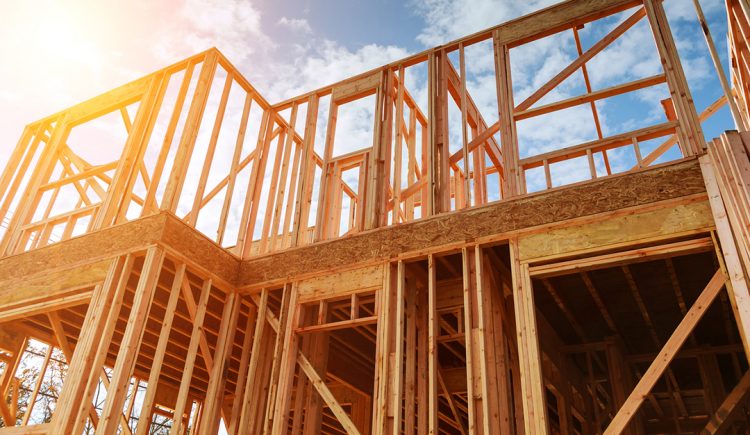Overall housing starts are down 7.0% to a seasonally adjusted annual rate of 1.53 million units, according to the latest Census Bureau report. Continued supply chain and labor shortages are hindering progress.
The July reading of 1.53 million starts is the number of housing units builders would begin if development kept this pace for the next 12 months. Within this overall number, single-family starts decreased 4.5% to a 1.11 million seasonally adjusted annual rate. The multifamily sector decreased 13.1% to a 423,000 pace.
The breakdown:
Housing Starts: 1.53 million (-7% month-over-month, +2.5% year-over-year)
Multifamily Starts: 412,000
Single-Family Starts: 1,111,000
Building Permits: 1.64 million (+2.6% month-over-month, +6% year-over-year)
Multifamily Permits: 532,000
Single-Family Permits: 1,066,000
Completions: 1.39 million (+5.6% month-over-month, +3.8% year-over-year)
Multifamily Completions: 426,000
Single-Family Completions: 954,000
Regional year-to-date permit data:
Midwest: +23%
South: +25.9%
West: +28.2%
Northeast: +24.9%
What the industry is saying:
“The latest starts numbers reflect declining builder sentiment as they continue to grapple with high building material prices, production bottlenecks and labor shortages. Policymakers need to prioritize the U.S. supply chain for items like building materials to ensure builders can add additional inventory the housing market desperately needs.” — National Association of Home Builders Chairman Chuck Fowke.
“The decline in single-family permits indicates that builders are slowing construction activity as costs rise. Starts began the year on a strong footing but in recent months some projects have been forced to pause due to both the availability and costs of materials.” — National Association of Home Builders Assistant Vice President of Forecasting & Analysis Danushka Nanayakkara-Skillington
“Rents will be soaring in the coming months, especially for apartment units, as homebuilding retreated in July. There was a housing shortage before the pandemic, and the shortage has been exacerbated during the pandemic. Therefore, homebuilding needed to be greatly ramped up as the jobs recovery took hold. Yet in July, housing starts fell by 7%—single-family construction is down by 4% and multifamily construction is down by 13%. Other factors holding back construction: supply-chain disruptions in getting the right material on a timely basis, lags in getting approvals for land lot development and labor shortages.
“With home prices having risen by record amounts over the past year, homebuying will become an increasing challenge, and a good number of households may simply decide to rent. In addition, the jobs recovery is enticing people out of their parents’ homes to seek their own housing. Consequently, rental demand is rising strongly. With an inadequate supply of available homes, rents will be strengthening and adding further pressure to overall consumer price inflation.” — National Association of REALTORS® Chief Economist Dr. Lawrence Yun
“In the wake of a year and a half of dramatic swings—from a steep drop during the 2020 quarantines to the frenzied pace of 2021’s first half—real estate markets are clearly moving toward normalization. Americans continue to seek the benefits of homeownership, encouraged by low interest rates and the desire for higher quality of life. And for many homeowners who sat on the sidelines this past year, the current seller’s market is motivating them to list their homes later in the season, with new listings rising at a higher rate in July than in a typical year. The number of existing homes coming up for sale has been rising for almost two months, including smaller homes, offering more affordable options to fatigued first-time buyers.
“The influx of inventory offerings has brought home price growth into single-digit territory. However, housing markets remain undersupplied, especially when it comes to affordable new homes. In the wake of a decade of underbuilding, we are still short several million homes for sale. With millennials broadly embracing homeownership as many move further into the third decade of life, the outlook for new home demand remains bright, which could give builders the confidence to pick up the pace.” — realtor.com® Senior Economist George Ratiu
“Both single-family and multifamily starts declined in July relative to June, but single-family starts remain almost 12% higher than last year. There are now almost 690,000 single-family homes under construction—the largest number since 2007. This is clearly a positive sign given the remarkably low levels of inventory on the market.
“Permits for single-family homes dropped slightly over the month but were higher than a year ago and remain higher than the level of starts. The pace of construction should continue to increase, particularly if supply-chain constraints begin to loosen.” — Mortgage Bankers Association SVP and Chief Economist Mike Fratantoni.












